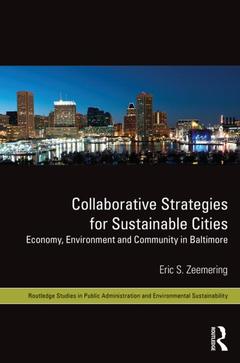Collaborative Strategies for Sustainable Cities Economy, Environment and Community in Baltimore Routledge Studies in Public Administration and Environmental Sustainability Series
Auteur : Zeemering Eric S.

Baltimore, like many other cities around the globe, is redesigning local government policy and programs in order to become a more sustainable city. Sustainability, as a concept guiding public action, encourages city officials to integrate policy and programs addressing the economic, environmental, and social health of the community. City governments, including Baltimore, have adopted plans to integrate this new priority into local policy and program management. Reorienting city policy and programs to address an emergent concern like sustainability requires collaboration between city government and various actors and organizations in the community.
Collaborative Strategies for Sustainable Cities examines how cities define sustainability and form policy implementation networks to integrate sustainability into city programs. Using the city of Baltimore to describe and analyze the involvement of the participants in local sustainability efforts in rich detail, Eric S. Zeemering argues that when we think about the sustainable city, the city government is not the best unit of analysis for our investigations or policy planning. Instead, policy networks within cities carve out slices of a sustainability agenda, define sustainability in their own ways, and form implementation networks with city government officials, neighborhood and community organizations, funders, and state and federal agencies in order to achieve specific goals. When cities begin to integrate sustainability into policies and programs, surveying and understanding competing definitions of sustainability within the community may be central to their success.
The book?s rich array of data, including qualitative data from elite interviews and public documents, Q-methodology and social network analysis will make for an engaging read to scholars of political science or public affairs as well as the interested citizen or policy advocate.
Preface. 1. Being a Sustainable City. 2. Sustainability in Baltimore. 3. Defining Sustainability in the City. 4. Policy Networks and Sustainability Implementation. 5. Collaborative Strategies for Baltimore and Beyond. Appendix: Methods of Investigation.
Eric S. Zeemering is an assistant professor in the Department of Public Policy at the University of Maryland, Baltimore County (UMBC). He completed a Ph.D. in political science at Indiana University. His research and teaching explore collaboration in public management and policy implementation.
Date de parution : 06-2014
15.2x22.9 cm
Date de parution : 12-2015
15.2x22.9 cm
Thème de Collaborative Strategies for Sustainable Cities :
Mots-clés :
Sustainability; Local Government; Policy Networks; Sustainable Development; Policy Planning; Social Network Analysis; Urban Politics & Policy; Baltimore; Q‐Methodology; Network Centrality; Public Management & Administration; Baltimore City; Urban Sustainability; Urban Heat Islands; Urban Sustainability Policies; BNIA; City’s Sustainability Goals; Public Engagement; Urban Sustainability Initiatives; Urban Rebuilding; Baltimore City Public Schools; Main Streets Program; Civic Health; Energy Efficiency; Energy Star; High In-degree Centrality; Public Administration; Reduce GHG Emission; Public Management Networks; Local Political Dialogue; Baltimore Metropolitan Region; Rio De Janeiro Brazil; ICMA Survey; Zebra Fish; Environmental Definition; Green Wall



